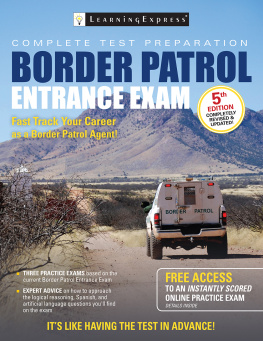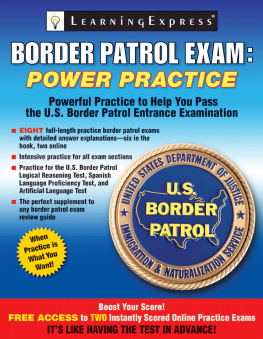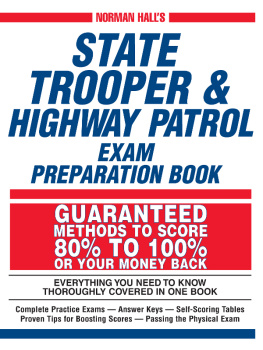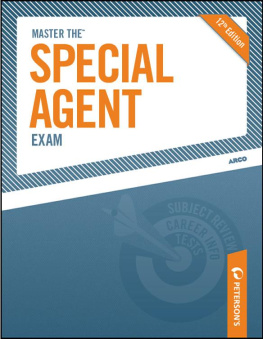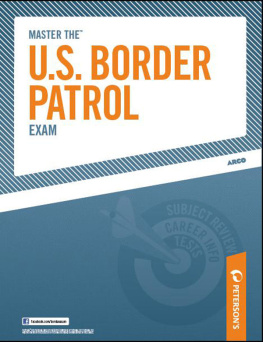CHAPTER 1
Becoming a Border Patrol Agent
CHAPTER SUMMARY
If you think you might like to pursue a career as a U.S. Border Patrol Agent, this chapter is the starting point for your journey. It provides a glimpse into the exciting and dangerous world of federal law enforcement with the U.S. Border Patrol. Youll also find out how to locate and apply for job openings, what the job requirements are, and what training you will need.
T he U.S. Border Patrol is a highly trained and extremely mobile uniformed federal law enforcement organization that relies on the latest law enforcement training techniques and operational technologies to prevent terrorists and illegal aliens from entering the country. It also prevents smuggling activities and handles the deportation of criminal aliens. The organization is statutorily authorized to enforce myriad federal laws anywhere in the United States and its possessions, which makes it the premier uniformed federal law enforcement agency. Border Patrol Agents operate in all types of environmentsfrom remote areas of the southern border to the highly urbanized downtown areas of cities such as San Diego, CA. Today more than ever, the men and women of the U.S. Border Patrol are relied on to protect the borders of the United States. Todays Border Patrol Agent represents the convergence of tradition, modern technology, advanced training, and unique skills.
A Short History of the U.S. Border Patrol
In order to fully understand all aspects of the Border Patrol Agent position, it is necessary to briefly review its proud tradition. As early as 1904, the U.S. Immigration Service assigned a token force of mounted inspectors to patrol the southern border of the United States to prevent illegal crossings. The officers were untrained and few in number, and authorities were unable to stem the rising tide of illegal aliens. In March 1915, Congress authorized a separate group of inspectors called mounted guards, or mounted inspectors, who operated from El Paso, TX. These guards, who never numbered more than 75, rode on horseback and patrolled as far west as California.
On May 28, 1924, Congress established the U.S. Border Patrol as part of the Immigration Bureau, a division of the Department of Labor. In 1925, patrol areas were expanded to include over 2,000 miles of seacoast extending along the Gulf and Florida coasts.
Initially, the Border Patrol recruited many of the early force of 450 officers from the Texas Rangers and local sheriffs and their deputies. These officers knew the land and the dangers it presented. Appointees from the Civil Service Register of Railroad Mail Clerks supplemented this rough-and-ready crew. The U.S. government initially provided the Border Patrol Agents a badge, a revolver, and an annual salary of $1,680.
Since its inception, the Border Patrol has achieved an almost legendary status in the law enforcement community. As in the past, Border Patrol Agents today continue to provide a critical service as their duties have evolved to encompass much more than preventing illegal entry into the United States.
What the Work of a Border Patrol Agent Is Really About
Even today, the work of a Border Patrol Agent is difficult, diverse, and, more often than not, extremely hazardous. This position is best suited to the rugged individualist who is self-assured, well educated, and well trained. The important task of protecting our sovereign borders in a humane and compassionate way, consistent with American ideals and security needs, has assumed an entirely new dynamic in a post-9/11 environment. So if you think this type of occupation is for you and you are prepared for the challenge of your life, read on!
IMPORTANT WEBSITE ADDRESSES
To find the latest information on all available federal law enforcement positions, including U.S. Border Patrol Agent, visit www.usajobs.gov.
To determine whether you are veterans preference eligible, visit www.dol.gov/elaws/vets/vetpref/mservice.htm.
Salary and Benefits
As a Border Patrol Agent, you will receive all the benefits of federal employment. The generous benefits package includes personal leave days, health and life insurance, and a retirement plan that offers retirement at age 50 after at least 20 years of service or retirement at any age after 25 years of service. This generous Law Enforcement Personnel plan includes pension and savings plans to form a multitiered, diversified retirement portfolio.
New Border Patrol Agents are always recruited at the GL-5, GL-7, or GL-9 level unless they are transferring from another federal agency. Where you start on the pay scale will depend on your previous education and experience in law enforcement. Salaries are significantly higher in certain metropolitan areas (like San Diego, CA). However, in general, annual starting salaries begin at around $39,400 and rapidly increase. Senior Patrol Agents routinely earn in excess of $70,000 per year, while Supervisory Patrol Agents routinely earn in excess of $80,000 per year. Keep in mind that typically 90% of Border Patrol Agents in any location are assigned to work a regular schedule of 100 hours every two weeks, which includes 2 hours of overtime per workday. Those who work at this level receive a salary supplement equal to 25% of their basic pay. Additionally, Border Patrol Agents who work more than their agreed-upon hours are provided compensation in the form of time off (capped at 240 hours a year).
Education and Experience Requirements for Border Patrol Agent Positions
The following table shows the amounts of education and/or experience required to qualify for Border Patrol Agent positions.
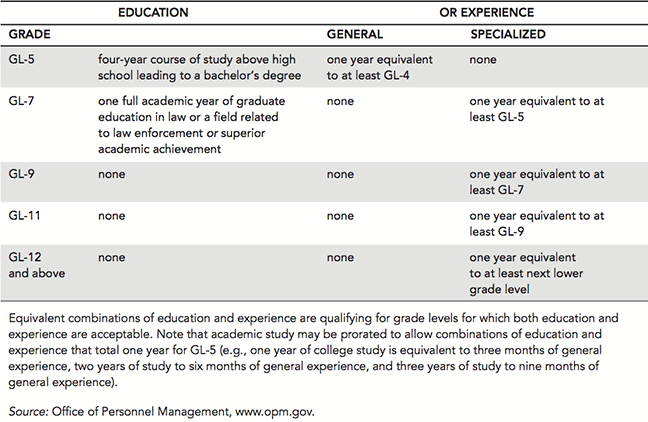
Under the accelerated promotion program, after six and a half months at the GL-5 entry level, you will be eligible for promotion to GL-7; individuals hired at the GL-7 level are eligible for promotion to GL-9. Border Patrol Agents are promoted noncompetitively to the GL-11 Journeyman level grade. However, these promotions are contingent upon new agents successfully completing their six- and ten-month probationary exams as well as the field training segment of the training program.
Where the Jobs Are
Due to overwhelming illegal immigration originating from our southern border, first duty stations of new Border Patrol Agents are almost always along the Southwest United States/Mexico border in California, Arizona, New Mexico, and Texas. Many initial assignments are located in small, isolated communities, and transfers from initial duty assignments are limited and normally at your own expense.
It is important that prospective agents consider the impact on their families of moving to an isolated community along the border where healthcare access, educational resources, entertainment, and housing may be extremely limited. This cultural shift is most prevalent in families relocating from highly urbanized areas such as New York City to remote locations like Eagle Pass, TX. In cases in which agents are first assigned to large metropolitan areas such as San Diego or Riverside County, CA, prospective agents should consider the cost of housing in local markets to avoid sticker shock. It is always a good idea to first visit the location where you may be assigned prior to formally accepting a position.
Trainee agents are not are not allowed to be assigned to stations within 100 miles of their hometown. Accordingly, when considering a position, be prepared for a complete household move. This move will be at your own cost (certain expenses may be tax deductible; check with your accountant).
What Makes a Good Candidate?
The task of a Border Patrol Agent is vital to the security of our country, inherently interesting, and exciting for the adventurous among us. If you are disciplined, physically fit, and up for a challenge, this position may be for you. Men and women leaving the military, recent college graduates, and current law enforcement officers are particularly good candidates for this position. Finally, because many local and federal law enforcement agencies seek the traits and training inherent in a Border Patrol Agent position and actively recruit agents, the U.S. Border Patrol often serves as an entry-level law enforcement position. Many Border Patrol Agents routinely move on to other positions throughout the federal government, including U.S. marshal, federal air marshal, drug enforcement agent, special agent, Naval Criminal Investigative Service, Federal Bureau of Investigation, U.S. Secret Service, and even the Central Intelligence Agency.
Next page
